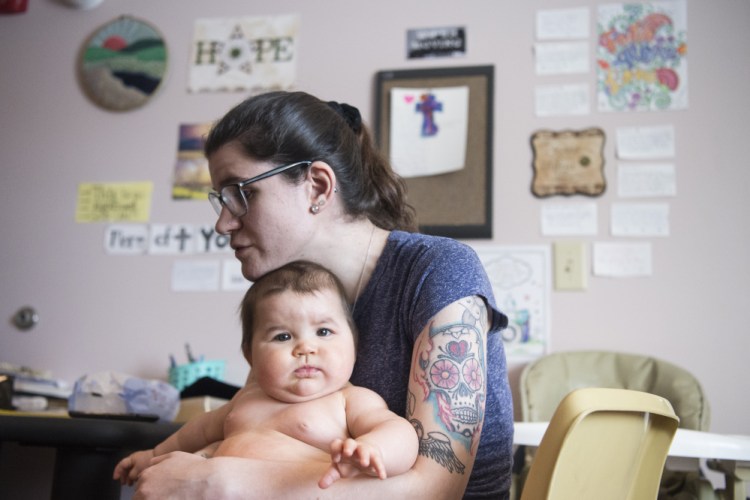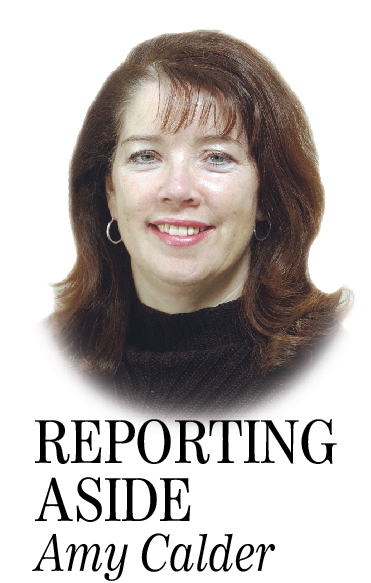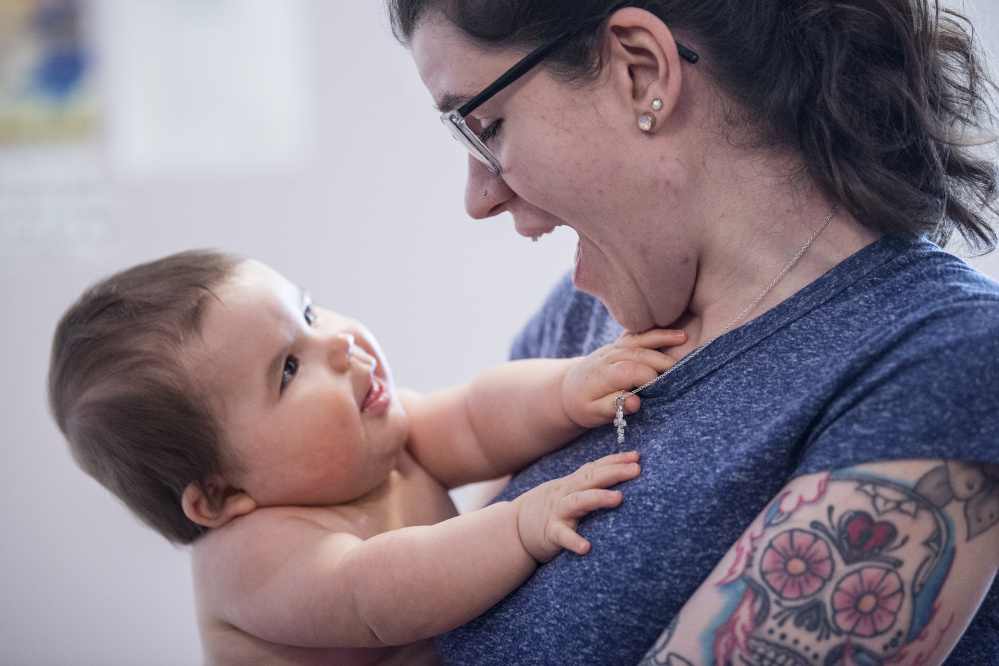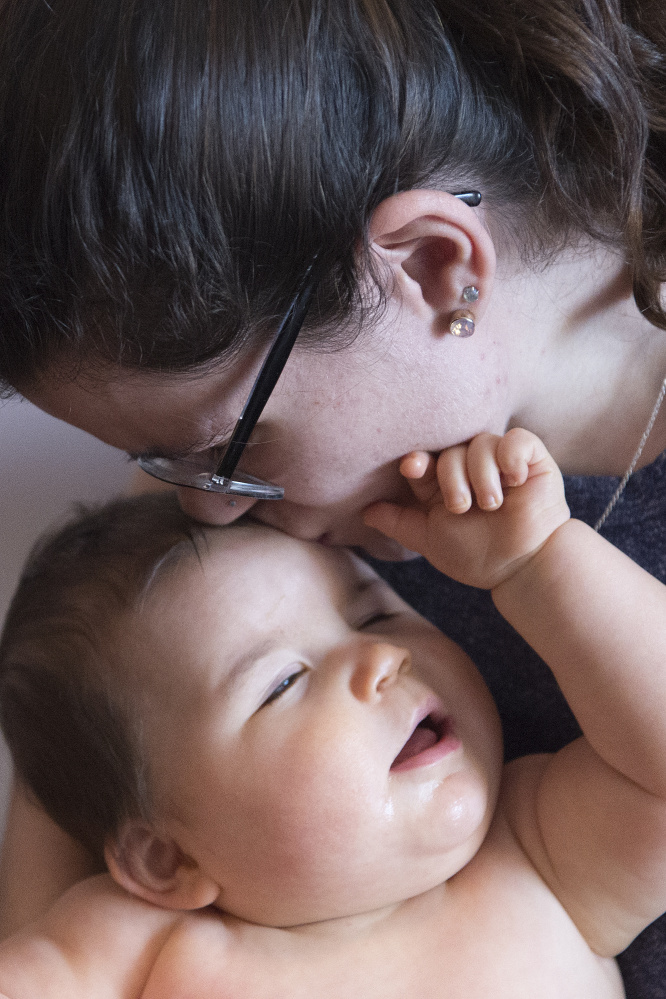It’s amazing what can occur when someone recognizes a person is in a tight spot and makes a phone call that changes everything.
Such is the case with Karen Normandin, dean of students at Kennebec Valley Community College, who read a newspaper story I wrote recently about Kayla Clifton, a single mother who lives at the Mid-Maine Homeless Shelter with her 8-month-old baby, Lilly.
Just before Christmas, Clifton, a former KVCC student, told me the story about how she ended up at the shelter earlier this year, pregnant and scared, after leaving an unhealthy relationship.
She returned to that unhealthy situation to have the baby, but soon realized she had made a mistake and went back.
Thanks to the support of shelter staff, Clifton has an apartment on the second floor and is working to get her life on track, obtain a driver’s license, get back into college and hopefully land a job. She also gets to have weekend visits with her older daughter, who is 6.
Clifton did a semester at KVCC two years ago and got good grades, but two weeks into the second semester, her grades plummeted as she suffered from severe depression and dropped out. That depression was influenced, in part, by the fact that her 6-month-old son had died suddenly in 2013, upending her life.
In December, she told me she was trying to work with KVCC to pay off an overdue $349 bill, as she wanted to re-enroll and major in psychology so she can become a counselor and help others.
I called the shelter Wednesday to talk with its executive director, Betty Palmer, about another matter and learned that Clifton, 26, had had a visitor moments earlier — Normandin, the KVCC dean of students.
Normandin told Clifton she was working to find scholarship money, not only to help with her overdue bill, but also for tuition, so Clifton can return to KVCC this month.
“She said that she read the article and she wanted to meet with me to see what she could do for me,” Clifton, a dark-haired, articulate woman, said Wednesday afternoon.
Clifton was sitting in her tidy second-floor apartment at the homeless shelter, an energetic Lilly bouncing on her knee and babbling.
“She’s a lovely woman,” she said of Normandin. “She definitely took a liking to Lilly and Lilly took a liking to her.”
Normandin even held Lilly in her lap for a while as she and Clifton spoke at length, she recalled.
“She brought my transcripts with her. I attended the first semester and I didn’t think I did that great but I got Bs. The second semester, I was there two weeks, but my depression was probably worse than it’s ever been because I didn’t have the support I have now. I didn’t tell my teachers about my depression. Two years later, I have support. I really opened up to her about the changes I’ve experienced in two years and just the past year alone. I think she understands that I have goals and that I’m determined. I have the right support and the right mindset now, whereas two years ago, it was definitely a struggle.”
Normandin told Clifton her two failed grades from that second semester would be expunged. Meanwhile, she listened intently to Clifton’s life story.
That story is long and a bit complicated, but in a nutshell, Clifton grew up an only child in Port Clyde, a small fishing village on the Maine coast, and moved to Waterville when she was 16. She lived with a lot of anger from her childhood, which was difficult for a lot of reasons, including that she was bullied by other kids.
She later married and had a daughter and then, her son, who had health problems, died suddenly.
“After I lost my son, I lost my life,” she said. “In 2013, I was living in Liberty, going through a divorce and heading back from a divorce hearing when I got the phone call. My son was with his grandparents. It was nobody’s fault — it just happened because it happened. Coming back from it has been hard. I was angry at God.”
When she became pregnant with Lilly in 2016, medical people were concerned as it appeared there was a problem and that the baby might die. Clifton remembered attempting to negotiate with God about that.
“I said, ‘God, if you let me keep this one, I might consider talking to you again,'” Clifton recalled. “My friend, Michelle, said a prayer to heal the blood to protect my pregnancy and have it go full-term. At my next appointment, everything was fine.”
After giving birth, Clifton left her boyfriend and returned to the shelter where Palmer, once again, took her under her wing without judging her.
“She has such a heart for people who are struggling,” Clifton said. “Betty is probably one of the biggest supports that I have because not only is she my landlord, but I consider her my friend and mentor. I go to her when I need to keep her in the loop. She’s been amazing. I told her my depression is probably what keeps me from interacting with people. She said, ‘Do you keep your shades open?’ She knows my situation. She has known me since I was 18, when I was pregnant with my oldest daughter.”
Meanwhile, Palmer says Clifton is a good example of someone who uses the support services the shelter provides — services available because of generous community support — and has worked hard to get a second chance.
“It really gives people a fair hand up, not a handout,” said Palmer, who often offers Clifton advice. “Sometimes people need simple things, like letting the light in — start with that,” Palmer said. “It’s slow. Sometimes change is slow and sometimes dealing with depression is complicated and as simple as, ‘Are you letting any light in today — and what’s next?'”
Palmer praised Normandin for recognizing the potential in Clifton and stepping up to help.
“We want to thank her from the bottom of our hearts. When community comes together, there’s nothing that can’t be done, and what Kayla and Lilly will give back in life will be a thousand times more than any help we’ve ever given her. Investing in somebody’s education keeps them from being homeless again — it breaks the cycle. This is the cycle for two generations — Kayla and Lilly. With getting an education, she will stand on her own two feet in a year or two.”
As I walked away from the homeless shelter, I thought about how insightful Palmer’s words were. I also remembered something Clifton said, that continues to reverberate in my head.
She was talking about how her faith and the support from shelter staff have given her a foundation she did not have before, so she is stronger now and better able to deal with adversity. She said she knows that foundation will help her in her studies at KVCC, which will hopefully lead to a job as a counselor.
“If I can make a career out of that and I can change lives and I can do what God is leading me to do, that’s really what it’s all about,” she said.
Interestingly, Clifton said that she not only has made new friends at the shelter, she has reconnected with people from her past and healed some bad relationships.
“It’s all about perspective,” she said. “If you allow yourself to forgive, you can find freedom. It took me a long time and I think that’s what my journey has been about the most — forgiveness of myself.”
I later called Normandin, who confirmed she is helping Clifton enroll in classes and work on financial aid. She said that had she not seen the story about Clifton’s plight, she never would have known about it and had an opportunity to reach out to her. Meeting Clifton was a privilege, and their discussion at the shelter was in-depth — and enlightening, according to Normandin:
“I was blown away by the conversation that she and I had and the level of sincerity in sharing her story and going public in hopes someone else would read about it and be inspired by what she has accomplished.”
Send questions/comments to the editors.






Comments are no longer available on this story